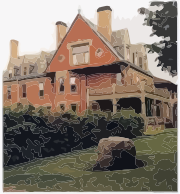
Zen Center
Encyclopedia

Shunryu Suzuki
Shunryu Suzuki was a Sōtō Zen roshi who popularized Zen Buddhism in the United States, particularly around San Francisco. Born in the Kanagawa Prefecture of Japan, Suzuki was occasionally mistaken for the Zen scholar D.T...
in the mid-twentieth century, and the San Francisco Zen Center
San Francisco Zen Center
San Francisco Zen Center , is a network of affiliated Sōtō Zen practice and retreat centers in the San Francisco Bay area, comprising the City Center or Beginner's Mind Temple, the Tassajara Zen Mountain Center, and the Green Gulch Farm Zen Center. The sangha was incorporated by Shunryu...
became the first Zen Center, incorporating in 1962. Neither temples nor monasteries (although at times operating such facilities), Zen Centers occupy a unique place in the historical development of Zen Buddhism and of Buddhism in the United States
Buddhism in the United States
Buddhism is one of the largest religions in the United States behind Christianity, Judaism and Nonreligious, and approximate with Islam and Hinduism. American Buddhists include many Asian Americans, as well as a large number of converts of other ethnicities, and now their children and even...
. As Zen practice has expanded throughout the United States over the last fifty years, the variety of Zen Centers has increased. While some are now the homes of wealthy communities in major cities (such as Zen Center of Los Angeles
Zen Center of Los Angeles
The Zen Center of Los Angeles , temple name Buddha Essence Temple, is a Zen center founded by Hakuyu Taizan Maezumi in 1967 that practices in the White Plum lineage.ZCLA observes a daily schedule of zazen, Buddhist services, and work practice...
), other Zen Centers have either humble or no permanent physical location - meeting in members private homes, university classrooms, and Quaker Meeting Houses to name but a few examples. While large and established Zen Centers may serve as the residence of priests, monks, and lay people, smaller and more rural Zen Centers may have no ordained members. Although some recent studies have been made regarding Zen in America, the area remains under researched, and still quite heterogeneous.
Architecture
While the exteriors of the centers often fit in with the areas they inhabit the interiors tend to have AsianCulture of Asia
The culture of Asia is human civilization in Asia. It features different kinds of cultural heritage of many nationalities, societies, and ethnic groups in the region, traditionally called a continent from a Western-centric perspective, of Asia...
influences. While not required most Zen Centers have a zendo
Zendo
or is a Japanese term translating roughly as "meditation hall". In Zen Buddhism, the zen-dō is a spiritual dōjō where zazen is practiced...
or meditation hall. Zen Centers may have residents, also known as monk
Monk
A monk is a person who practices religious asceticism, living either alone or with any number of monks, while always maintaining some degree of physical separation from those not sharing the same purpose...
s (for males) and nun
Nun
A nun is a woman who has taken vows committing her to live a spiritual life. She may be an ascetic who voluntarily chooses to leave mainstream society and live her life in prayer and contemplation in a monastery or convent...
s (female), who may live in the center's residence area. Most have kitchens and communal areas.
Some centers do not have mirrors in the bathrooms. This is to assist the practitioner from focusing on unimportant parts of zen practice, such as facial appearance.
Zen Center resident life
Life as a resident is different from lay life (also known as householderHouseholder
A householder is a person who is the head of a household; see House.Householder is also a family name:*Alston Scott Householder, American mathematicianMathematical topics named after A.S...
). Residential rooms and common areas lack televisions and other common modern pastimes. Access to many creature comforts are reduced. Residents are required to perform daily chores. Times for zazen
Zazen
In Zen Buddhism, zazen is a meditative discipline practitioners perform to calm the body and the mind, and be able to concentrate enough to experience insight into the nature of existence and thereby gain enlightenment .- Significance :Zazen is considered the heart of Zen Buddhist practice...
(zen sitting meditation) and other aspects of practice are built into the daily schedule. Superfluous talking is discouraged; instead a resident should be practicing mindfulness in all they do.
Etiquette
As in Asian cultures, shoes are not worn in most areas of a zen center.Members of zen center have access to areas outside of public areas. It is not considered polite to wander around the Zen Center unescorted. At most centers, the abbot or Roshi
Roshi
is a Japanese honorific title used in Zen Buddhism that literally means "old teacher" or "elder master" and sometimes denotes a person who gives spiritual guidance to a Zen sangha or congregation...
is available by appointment only. A level of respect must always be observed with regard to all things in the center from the Roshi to the kitchen.
For Zendo etiquette see Zendo
Zendo
or is a Japanese term translating roughly as "meditation hall". In Zen Buddhism, the zen-dō is a spiritual dōjō where zazen is practiced...
General zendo etiquette:
When entering the Zendo
Zendo
or is a Japanese term translating roughly as "meditation hall". In Zen Buddhism, the zen-dō is a spiritual dōjō where zazen is practiced...
bow towards the Buddha with hands held in Gassho. If anyone is sitting in the Zendo
Zendo
or is a Japanese term translating roughly as "meditation hall". In Zen Buddhism, the zen-dō is a spiritual dōjō where zazen is practiced...
all effort to remain quiet
Quiet
Quiet may refer to:* Silence, a relative or total lack of sound* Quietism * Quiet game, a children's "game" where children must stay quiet and still, on fear of punishment* QUIET, an astronomy experiment...
must be observed.

